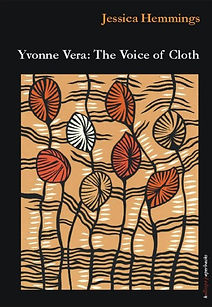
Verlagsprogramm - ein Auszug
38.90 €
377 pp, hardcover
cover illustration: (c) Flora Veit-Wild
ISBN: 978-3-9814953-0-0
published in 2012
instant delivery
Edited by
Julius Heinicke, Hilmar Heister, Tobias R. Klein,
Viola Prüschenk
Bridges connect two entities divided by a gap. Flora Veit-Wild has been a traveler of worlds, in the flesh and in the mind. Her insistence on the emphatic modernity of African literatures have influenced academics and artists from all walks of life, as well as shaping her own research, that includes topics such as surrealism, codeswitching, “new orality”, discourses of body, gender, sexuality, madness and violence, questions of cultural translation and the history of scholarship.
This volume compiles a variety of scholarly, literary and artistic contributions from her friends and colleagues in Germany, Zimbabwe and other countries. Our connections to others are bridges of the metaphorical kind, crossing the chasms of intersubjective differences – Building Bridges can be translated into Shona as kuvaka ukama, literally “building relations”.
The various contributions to this volume reflect on how Flora has reached out and formed relations and alliances with a great variety of people. She has strongly influenced many upcoming scholars and has contributed immensely to the development of the studies of African literatures, especially here in Berlin, Germany.
The Contributors:
Anne Adams, Ulrike Auga, Jane Bryce, Chirikure Chirikure, Lutz Diegner, Sule Egya, Susanne Gehrmann, Liselotte Glage, Ricarda de Haas, Helon Habila, Julius Heinicke, Hilmar Heister, Annekie Joubert, Eileen Julien, Tobias Robert Klein, Maria Kublitz-Kramer, Kahiudi Claver Mabana, Christine Matzke, Chiedza Musengezi, Dirk Naguschewski, Shumirai Nyota, Marion Pape, Ineke Phaf-Rheinberger, Lesego Rampolokeng, Frank Schulze-Engler,
Bettina Weiss, Tobias Wendl.
Books are the bees which carry the quickening pollen from one mind to another.
James Russell Lowell

36.90 €
255 pp, softcover
cover illustration: (c) Petra Börner
ISBN: 978-3-9810798-5-2
published in 2008
out of stock (backlist)
Jessica Hemmings
Yvonne Vera: The Voice of Cloth
The Voice of Cloth explores the presence and purpose of cloth as metaphor, structure, and object in the fiction of late Zimbabwean author Yvonne Vera. Throughout this research, the production and consumption of cloth are understood to represent domestic graphologies, a term coined by Vera in her own Ph.D. work which refers to communication that goes unnoticed by conventional discourse because of the domestic, and therefore seemingly inconsequential, materials appropriated to convey information. Here an often overlooked element of narrative and life – the textile – is shown to play a central role in the articulation of the often silenced experiences of incest, infanticide, abortion, and rape that make up the narratives of Nehanda (1993), Without a Name (1994), Under the Tongue (1996), Butterfly Burning (1998) and The Stone Virgins (2002).
28.00 €
261 pp, softcover
cover illustration: (c) Bettina Weiss
ISBN: 978-3-0001451-4-8
1st print 2004
2nd print 2005
instant delivery
Contemporary Perspectives on Southern African Literatures
Edited by Bettina Weiss
This study focuses on contemporary literatures of the southern African region and brings together the work of scholars who cover pressing questions about the constructions of Othering, about locked-away-narratives &ndash stories which are regarded as anathema to society or narratives about the female teras or the twisted “reality” of the construction of the family, the nation, or history. Their work comprises aspects of the implementation of strategic devices which are used to justify and reinforce these constructions, but it also elaborates the strategies which hold the potential to subvert and destabilise rigid conceptions. The study reflects on issues such as the diverse modes of portraying HIV/AIDS in literatures of South Africa and Zimbabwe; it examines the socio-(homo)sexual experiences of Black Men in South Africa; it traces the traumatic transitions in Namibia from the war to its aftermath, read through the prism of gender; it proposes homoerotic readings of Black women's desires; and it demonstrates how “speaking” textiles function as a recurrent image for the contradictions inherent in the postcolonial voice and how they offer new structures to tackle silence. This collection is united by the contributors' attempts to lift the veil from unheard narratives by moving them from the margin to the centre of discussion. The essays vividly demonstrate that the end of unheard narratives, as the title of this book reads, holds a double-sided implication.
The Editor:
Bettina Weiss received her PhD in the field of gender and body discourse in African women's writing of Southern Africa at the Humboldt University of Berlin, Germany. Dissertation published by Peter Lang Publishers, Frankfurt, 2004.
The Contributors:
Lizzy Attree, Katrin Berndt, Dorothy Driver, Bevelyn Dube, Jessica Hemmings, Robert Muponde, Agnes Muriungi, Tom Odhiambo, Margie Orford, Charles Pfukwa, Meg Samuelson, Annemarié van Niekerk, and Bettina Weiss.
Tomáš Hubálek et al.
SOCIAL, CULTURAL, ETHICAL AND POLITICAL ASPECTS OF MIGRATION
42.95 €
176 pp, softcover
cover illustrations: (c) Jim Pennucci
ISBN: 978-3-9820327-1-9
published in December 2018
instant delivery
This publication brings together expert analysis of the migration phenomenon from the perspectives of several social science disciplines (e.g. political science, philosophy, ethics, history, didactics). It also describes reactions that emerge in current society regarding migration.
The first three chapters characterize the issue of migration from the perspectives of political science, philosophy, ethics and the mass media. In the fourth part, the key concept of tolerance is analysed in this context, and the social and cultural diversity of the so‐called Visegrád Four is considered. In the following part, some organization characteristics that directly or indirectly interfere with migration are addressed. The chapters six to nine describe, for selected examples, historical and legal parallels that can be seen in the current situation. The tenth and last part offers a proposal for the transformation of knowledge into a didactic approach.
The main contributions of the publication are not only to provide a professional, multi-disciplinary approach to the problem, and to propose its didactic use in teaching, but also to synthesize the experiences of this international group of experts.




